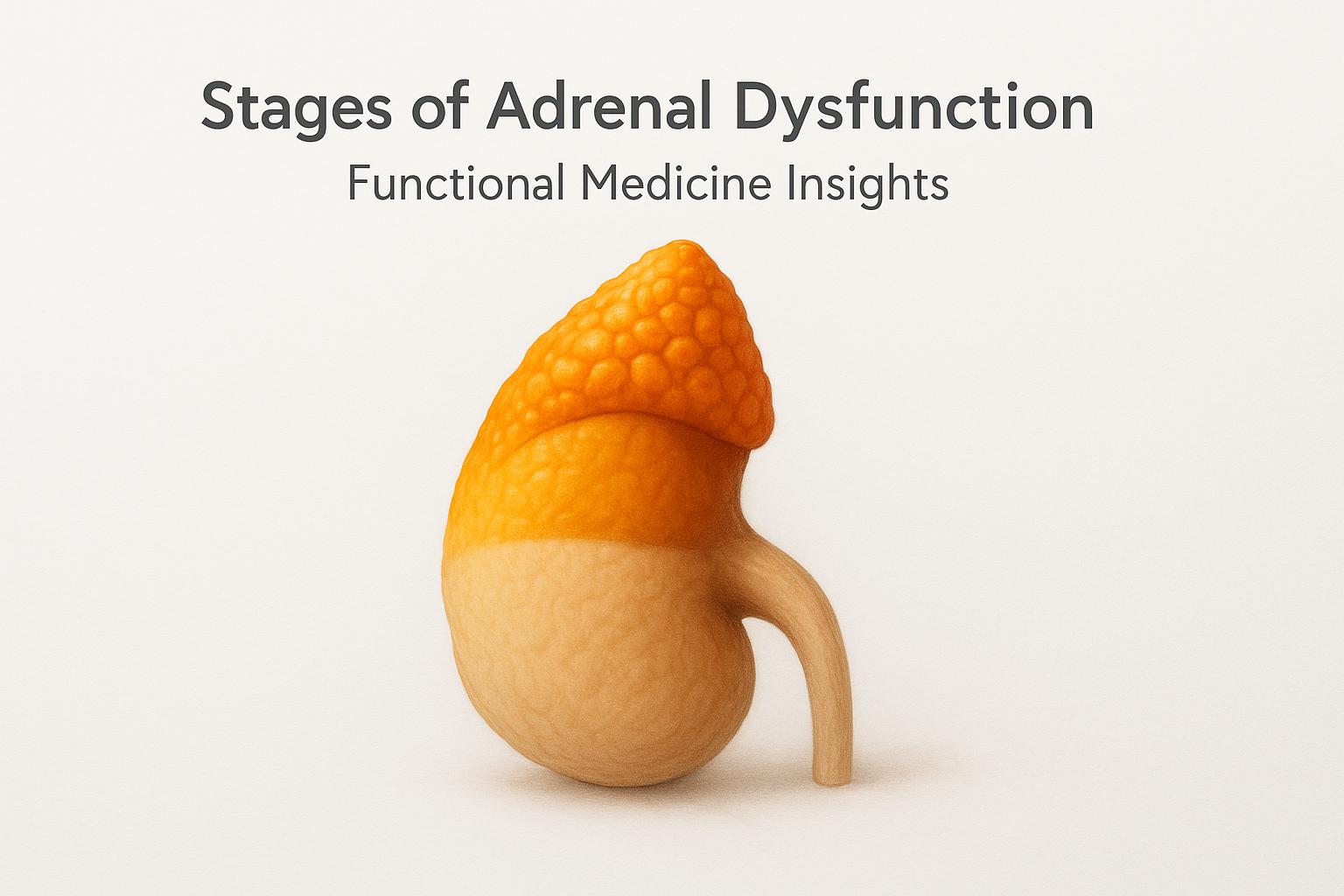Adrenal dysfunction occurs when your adrenal glands, responsible for producing stress-regulating hormones like cortisol, struggle to keep up with chronic stress. This process typically unfolds in three stages:
- Stage 1: High Alert – Your body produces too much cortisol, leading to anxiety, trouble sleeping, and feeling "wired but tired."
- Stage 2: Struggling to Adapt – Cortisol levels become irregular, causing fatigue, energy crashes, irritability, and reliance on stimulants.
- Stage 3: Complete Exhaustion – Cortisol production drops significantly, resulting in chronic fatigue, brain fog, and depression.
Functional medicine focuses on identifying adrenal dysfunction early through tools like saliva testing, which measures cortisol patterns throughout the day. Recovery involves lifestyle adjustments, stress management, proper nutrition, and targeted supplements. Addressing these issues early can prevent long-term damage and improve energy, focus, and well-being.
Three Stages Of Adrenal Fatigue: Alarm, Resistance, Exhaustion
3 Stages of Adrenal Dysfunction
Adrenal dysfunction unfolds in three distinct stages, each with unique symptoms and lab findings. These stages can explain why you might feel energetic one day and utterly drained the next. Understanding them is key to targeted testing and creating recovery plans tailored to your needs.
Stage 1: High Alert Phase
In this initial stage, your adrenal glands go into overdrive, producing excessive cortisol – particularly in the morning – to help your body cope with ongoing stress. Common symptoms include heightened alertness, anxiety, difficulty sleeping, and occasional fatigue. Many describe this as feeling "wired but tired." Lab results typically show elevated cortisol levels, and sometimes higher DHEA levels as well. However, this heightened state is unsustainable in the long run.
Stage 2: Struggling to Adapt
As stress persists, your body begins to falter in its ability to maintain balance. This stage is marked by an irregular cortisol rhythm: levels may spike in the morning and crash by the afternoon, or remain abnormally high instead of tapering off naturally. Symptoms include constant fatigue, mid-day energy slumps, irritability, and an increased reliance on stimulants like caffeine or sugary snacks to push through the day. Lab tests often reveal multiple cortisol imbalances – for example, high levels in the morning paired with low levels later in the day – and a drop in DHEA as the body prioritizes cortisol production. These hormonal shifts can disrupt productivity and sleep quality, making daily life increasingly challenging.
Stage 3: Complete Exhaustion
By this point, the adrenal glands are no longer able to keep up with the body’s demands. Cortisol levels remain consistently low throughout the day, signaling severe dysfunction of the hypothalamic-pituitary-adrenal (HPA) axis. Symptoms in this stage include chronic fatigue, mental fog, depression, poor focus, and sleep that fails to refresh. Many people in Stage 3 find it difficult to get out of bed and may also experience low blood pressure and intense salt cravings. Lab results confirm persistently low cortisol levels, aligning with the debilitating symptoms.
| Stage | Cortisol Pattern | Key Symptoms |
|---|---|---|
| Stage 1: High Alert | High, especially in morning | Anxiety, heightened alertness, disrupted sleep |
| Stage 2: Struggling to Adapt | Irregular (high AM, low PM) | Fatigue, energy crashes, irritability |
| Stage 3: Complete Exhaustion | Low all day (flat curve) | Chronic fatigue, brain fog, depression |
These stages highlight the adrenal glands’ gradual decline in responding to stress and maintaining hormonal balance. Early intervention during Stage 1 or Stage 2 – through stress management, lifestyle adjustments, and targeted nutrition – can often reverse the dysfunction. By contrast, Stage 3 requires a more intensive and prolonged recovery process. Identifying your stage is crucial for effective treatment, as factors like age, pre-existing health conditions, and daily habits can influence the severity and recovery timeline.
For personalized assessments and recovery plans, clinics like Kinnection Clinic provide comprehensive lab testing and customized solutions.
Testing Methods for Adrenal Problems
Identifying adrenal dysfunction accurately is essential for determining its stage and crafting a recovery plan that works.
Dr. Emilie Wilson ND, L.Ac. emphasizes, "adrenal testing is a key part of this approach because it provides valuable insights into how stress is affecting the body".
Research indicates that nearly 80% of adults in the United States will face some level of adrenal dysfunction during their lifetime. By pinpointing the causes of fatigue and stress, proper testing lays the groundwork for targeted treatments, aligning with a functional medicine approach to overall health.
Saliva Testing for Cortisol and DHEA
Saliva testing is a straightforward, non-invasive way to evaluate adrenal function. Unlike blood tests, which only capture hormone levels at a single point in time, saliva tests measure free, active hormones circulating in your body. This method includes the cortisol awakening response (CAR), which tracks daily hormone changes with up to 90% accuracy for conditions like Cushing’s syndrome . Typical cortisol levels in saliva tests range from 10.2–27.3 ng/mL in the morning to 2.2–4.1 ng/mL at night. At-home saliva tests are widely available, with costs ranging from $50 to $400.
Complete Lab Work Panels
While saliva tests focus on cortisol patterns, comprehensive lab panels provide a broader view of adrenal health. Functional medicine practitioners often use the Adrenal Stress Index (ASI), which evaluates cortisol and DHEA levels alongside hormone panels to see how adrenal dysfunction impacts other systems. Micronutrient testing can identify deficiencies that may slow recovery, while thyroid testing is critical since thyroid issues can either mimic or worsen adrenal dysfunction symptoms.
| Test Type | What It Measures | Best For |
|---|---|---|
| Saliva Tests | Cortisol patterns throughout the day | Assessing chronic stress and daily rhythms |
| Urine Tests | Total cortisol output and metabolites over 24 hours | Understanding cortisol production and clearance |
| Blood Tests | Single-point cortisol levels with ACTH | Quick snapshots when paired with other markers |
Urine testing adds another layer by analyzing both cortisol production and clearance, which can explain variations in recovery. Together, these tests help refine treatment plans and address common challenges in diagnosing adrenal dysfunction.
Common Diagnosis Problems
Proper testing not only resolves diagnostic challenges but also supports the functional medicine goal of identifying subtle dysfunctions. Diagnosing adrenal issues can be tricky, leading to delayed treatment. In fact, 20% of patients with adrenal insufficiency remain undiagnosed for over five years after symptoms first appear. This is partly because conditions like thyroid disorders, chronic fatigue syndrome, fibromyalgia, autoimmune diseases, and mental health issues often mimic adrenal dysfunction.
The debate over adrenal fatigue adds another layer of complexity.
The Endocrinologists argue, "no scientific proof exists to support adrenal fatigue as a true medical condition".
Symptoms such as fatigue, weakness, and brain fog are vague and can point to a variety of conditions. Conventional medicine tends to focus on severe adrenal insufficiency, like Addison’s disease, while functional medicine seeks to uncover earlier, subtler dysfunctions before they escalate.
To differentiate adrenal insufficiency from other conditions, a detailed medical history, physical exam, and targeted diagnostic tests are critical. Considering that stress plays a role in 60–80% of doctor visits, digging deeper to uncover underlying patterns is essential.
For a comprehensive adrenal evaluation and customized testing protocols, check out Kinnection Clinic, where functional medicine focuses on addressing the root causes of adrenal dysfunction.
sbb-itb-d9e542d
Treatment Plans for Adrenal Recovery
Recovering from adrenal dysfunction involves more than just addressing symptoms – it requires a thoughtful and thorough approach. Research suggests that stress contributes to around 70% of visits to primary care providers, making effective recovery strategies essential. A well-rounded adrenal recovery plan blends lifestyle adjustments, nutritional support, and personalized care tailored to each individual’s condition and needs.
Daily Habit Changes
Getting quality sleep is one of the most important steps in adrenal recovery. The National Sleep Foundation advises adults to aim for 7–9 hours of sleep each night. To promote restful sleep, stick to a consistent bedtime and wake-up schedule, avoid screens for at least an hour before bed, and create a calming nighttime routine.
Stress management is equally crucial. Practices like deep breathing, meditation, or gentle stretching for 10–15 minutes a day can make a noticeable difference in reducing stress levels. These simple habits help regulate the nervous system and improve overall well-being.
When it comes to physical activity, balance is key. Gentle exercises such as walking, yoga, or light strength training can improve mood and energy without straining the body. Aim for 20–30 minutes of low-impact movement most days, but avoid high-intensity workouts, which could do more harm than good during recovery.
Managing daily stressors also plays a big role. Set healthy boundaries, limit screen time, and consider seeking help from licensed counselors or health professionals when needed. These steps can make stress more manageable and support your healing journey.
Nutrition and Supplement Support
Nourishing your body with the right foods is vital for adrenal recovery. A nutrient-rich diet can help reduce inflammation and keep blood sugar levels stable. Focus on incorporating dark leafy greens, berries, omega-3-rich fish, nuts, and seeds into your meals. Starting your day with a balanced breakfast that includes protein, healthy fats, and complex carbs can help maintain steady energy throughout the day.
Hydration is another important factor. Drinking plenty of water and adding a pinch of sea salt to your diet can help maintain electrolyte balance.
Supplements may also provide extra support, especially when lifestyle changes alone aren’t enough. Adaptogenic herbs like Rhodiola and Ashwagandha can help the body cope with stress. Key nutrients such as Vitamin C (500 mg to 2 g daily, depending on tolerance), B-vitamins, and magnesium glycinate are often recommended to support adrenal health. Always consult with a naturopathic doctor to create a personalized supplementation plan that fits your specific needs.
Custom Recovery Plans
Functional medicine practitioners often design tailored recovery protocols that address the unique needs and stages of adrenal dysfunction. These plans may include dietary adjustments, targeted supplements, hormonal support, and techniques for regulating the nervous system.
Recovery timelines vary from person to person, so regular lab testing is essential to monitor progress and fine-tune treatment strategies. Addressing the gut-brain connection can further improve mental health and resilience to stress. Correcting deficiencies in key nutrients like omega-3 fatty acids, L-glutamine, and Vitamin D is often a critical part of the recovery process.
At Kinnection Clinic, specialists create customized adrenal recovery protocols by combining functional medicine testing with targeted treatments. Their approach includes hormone replacement therapy, IV therapy, and personalized wellness plans aimed at restoring adrenal health and achieving long-term vitality.
Building Better Adrenal Health Long-Term
Strengthening adrenal health over the long haul requires more than just short-term fixes – it’s about making consistent lifestyle adjustments that address the root causes. This proactive approach helps prevent future issues and supports overall well-being.
Early detection plays a key role in improving outcomes. For instance, research reveals that 58.8% of individuals with glucocorticoid-induced secondary adrenal insufficiency regained normal adrenal function within one to two years when managed appropriately. Areej K Younes, MBBS, emphasizes the importance of proper identification:
"Identifying patients at high risk for developing adrenal insufficiency and the appropriate testing protocols is crucial to avoid unnecessary glucocorticoid replacement on one hand, and missing a diagnosis of adrenal insufficiency with detrimental consequences on the other."
Recognizing the signs early, paired with consistent habits, lays the groundwork for robust adrenal health.
Daily practices are the cornerstone of long-term adrenal well-being. Stress management techniques like meditation and yoga help regulate the nervous system and build on earlier recovery strategies. Nutrition is equally essential. A Mediterranean diet rich in nutrients, stable blood sugar levels, and proper hydration (including sea salt) all contribute to adrenal balance . Quality sleep also plays a vital role – adults should aim for 7–9 hours of restful sleep each night by sticking to regular sleep schedules and prioritizing sleep hygiene. Interestingly, a 2020 study found that taking two 30-minute forest walks daily improved both sleep efficiency and total sleep time.
A functional medicine approach goes beyond just treating symptoms. It examines underlying issues like inflammation, nutrient deficiencies, sleep disorders, and chronic infections that might disrupt the HPA axis. Moderate, regular exercise is another important component for maintaining adrenal health.
At Kinnection Clinic, the focus is on addressing these root causes through a functional medicine lens. Their approach combines hormone replacement therapy, personalized wellness plans, and continuous monitoring to ensure long-term recovery and vitality.
Adaptogenic herbs, such as Ashwagandha and Rhodiola, can also play a supportive role by helping balance stress hormones. These natural remedies align with the comprehensive, individualized strategies used in earlier recovery phases.
Maintaining adrenal health isn’t about drastic changes – it’s about making small, consistent adjustments that are easy to sustain. Over time, these manageable shifts lead to lasting results.
FAQs
What are the best lifestyle changes to support recovery from adrenal dysfunction at different stages?
Recovering from adrenal dysfunction means making lifestyle adjustments that match the condition’s severity. In the earlier stages, the focus should be on managing stress. Practices like meditation, yoga, or deep breathing can be incredibly helpful. Cutting back on stimulants such as caffeine is also important. At the same time, aim for consistent, high-quality sleep, and stick to a nutrient-rich diet filled with fruits, vegetables, healthy fats, and lean proteins.
For more advanced stages, gentle physical activity like walking or swimming can be beneficial. These activities help restore energy without placing too much strain on the body. Staying hydrated and considering targeted supplements may also support recovery. By consistently following these habits and working with a personalized wellness plan, you can address the underlying causes of adrenal dysfunction and work toward lasting energy and health.
What makes functional medicine different from conventional medicine when it comes to diagnosing and treating adrenal dysfunction?
Functional medicine takes a whole-body approach to understanding and treating adrenal dysfunction. Instead of simply managing symptoms, it aims to uncover and address the underlying causes of imbalance. By examining the entire HPA axis (hypothalamic-pituitary-adrenal axis) and the body’s stress response, this approach uses advanced diagnostic tools to get a clear picture of adrenal health.
Treatment plans in functional medicine are customized to each individual. These plans often include targeted dietary changes, stress management techniques, lifestyle modifications, and natural supplements designed to restore balance. On the other hand, conventional medicine tends to focus on managing symptoms, frequently relying on medications to treat adrenal insufficiency without always digging into stressors or lifestyle influences.
By tackling the root causes of adrenal dysfunction, functional medicine aims to support long-term health and energy, helping individuals regain balance and vitality.
Can adrenal dysfunction be reversed, and how long does recovery usually take?
Adrenal issues can often be addressed, especially if caught early, but the time needed for recovery depends on how severe the condition is and its root cause. For example, mild cases like adrenal fatigue usually see improvement within 12 to 24 months when supported by lifestyle adjustments, stress reduction, and proper nutrition.
On the other hand, more serious conditions such as Addison’s disease are typically permanent and require lifelong hormone replacement therapy to manage. Recovery from adrenal insufficiency caused by steroid use can take around 6 to 12 months after stopping glucocorticoid medications. Acting early, tailoring treatment to individual needs, and maintaining steady stress management are crucial for the best possible outcomes.



